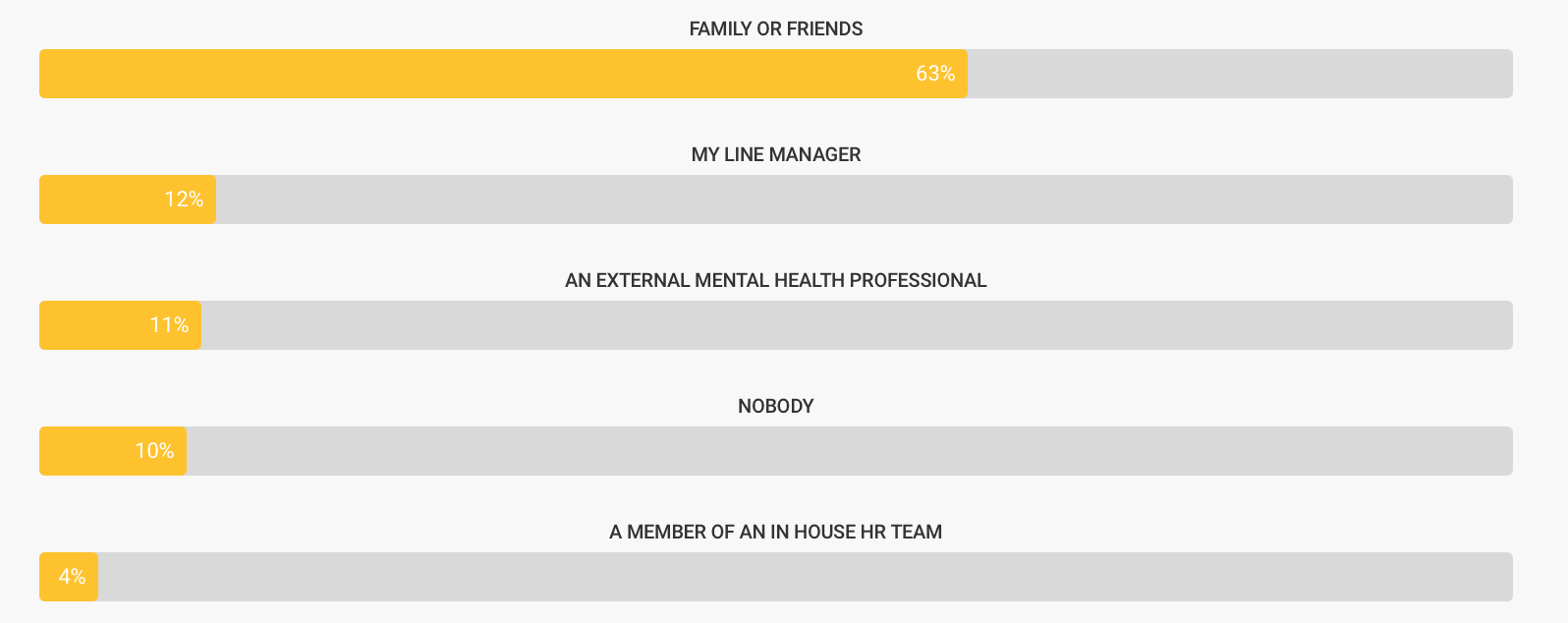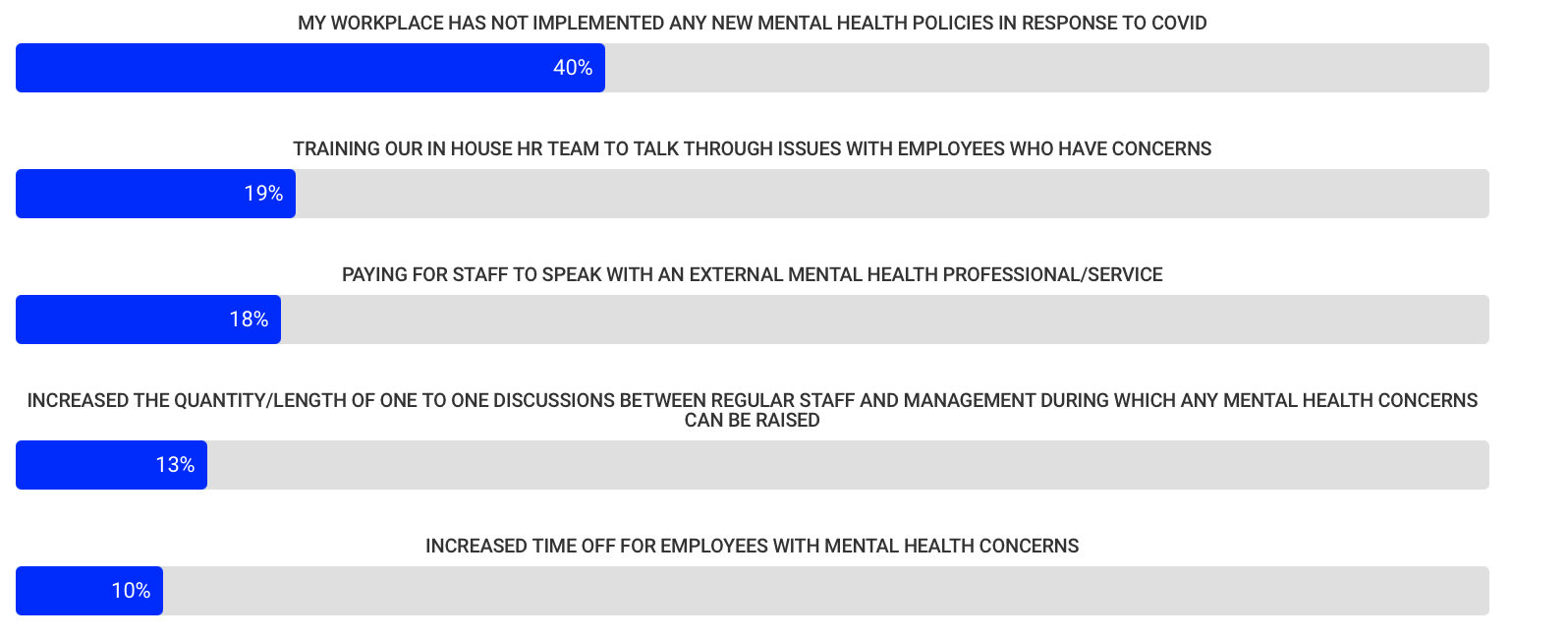
According to fresh research we’ve conducted as part of our insights into workforce training, 66% of employees think that moving forward, more time and resources will be dedicated to mental health in the workplace due to Covid. This data comes from an anonymous survey of UK employees from 300 companies carried out since the New Year, which sought to identify attitudes towards mental wellbeing and how they have been shaped throughout the pandemic in advance of Time to Talk Day on February 4th.
Key Findings
- 66% of workers agree that mental health will benefit from greater time and resources in the long term after Covid
- However, 40% of workplaces are yet to implement any new mental health policies in response to the pandemic
- 10% of respondents stated that if they had a mental health concern, then they would not speak to anyone about it
- Of the other 90%, 63% would prefer to talk things through with a friend or family member before doing so with someone at work
Do you think that Covid will lead to a long-term increased focus on mental health in the workplace?

Data gathered from 300 organisations on 11/1/21.
These findings come at a time when the mental health of the nation is being tested like never before. For those working from home, semi-frequent video calls are hardly a substitute for normal social interaction. To be without the day to day camaraderie that comes with office life isn’t easy and even those who tend to prefer to be left to their own devices at work are feeling the strain.
If you had a mental health concern today, who would be the first person that you would speak to about it?
Encouraging employees to speak up about their mental health concerns has long been something that many organisations have struggled with. Previous research has found that 45% of workers with mental health problems had not told their employer about it and often cited fears of shame and discrimination as their reasons for not doing so.

Data gathered from 300 organisations on 11/1/21.
From those surveyed who replied that they would not discuss their mental health concerns with anyone, 13% of men agreed with this statement as opposed to just 8% of women. 70% of women stated that they would first turn to friends or family, and whilst most men agreed, it was only 54% who did so. 18% of men also expressed a preference for talking things through with their line manager, more so than the 8% of women who did so.
Which of the following mental health policies has your workplace implemented in response to Covid?
Although as mentioned, 40% of workforces are yet to implement new mental health policies to counteract Covid, steps have been taken elsewhere as the following chart shows. This could be down to multiple reasons but organisations should never operate under the assumption that all is well just because nobody is voicing any concerns.
As Emma Mamo, Head of Workplace Wellbeing for the charity Mind points out, “you don’t need to have a mental health problem in order to feel the benefits (of preparing for it in advance). It just means that you already have practical steps in place to ensure you are supported when you aren’t feeling great.”

Data gathered from 300 organisations on 11/1/21.
Of those who opted to bring in new policies to address Covid related mental health issues, the most popular approaches were to assign responsibility for such matters to either an in house or external specialist, with 18% and 19% of respondents opting for these respective approaches. There was less enthusiasm for increasing time off for employees with mental health concerns (10% of respondents) and placing a greater emphasis on existing staff/management discussions (13%).
The costs of not investing in your employees mental health
Speaking about the findings from their survey, CoursesOnline’s General Manager Sarah-Jane McQueen drew attention to the duty employers have to invest in their people.
“Rather than continue as though the current situation is just a drop in the ocean, the ongoing crisis should be the catalyst for everyone to reassess their approach to workforce mental health.
For the 40% of organisations not looking to do more in regards to mental health, there is a strong business case for them rethinking their approach – not to mention that there is a clear expectation from the majority of workers that some form of action is taken. Regardless of where or how you operate, mental health issues account for a significant proportion of days off, so I would think that firms would be keen to gain back some of this productivity if nothing else.”
What can you do to combat mental health issues in the workplace?
Ultimately, there are many different options through which organisations can look to address mental health issues and everyone will have their own preference. At the Learning People for instance, they have experimented numerous initiatives which others may look to adopt such as:
- Creating an employee wellbeing group with a wellbeing rep nominated from each team to be the wellbeing spokesperson
- All members of the employee wellbeing group are Mental Health Awareness trained by ‘Mind’ to ensure they know how to spot the signs of poor mental health and provide support where necessary
- Participation in Time to Talk Day – providing conversation starter cards and cakes to all employees to raise awareness of the importance of talking to others
- Regular calls with HR for all employees who are working from home and more frequent calls with those who require additional mental health support
- Discounted gym and fitness schemes due to the link between good physical and mental health




